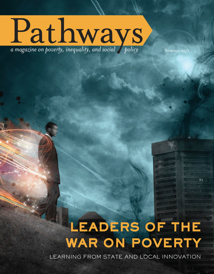State and Local Innovation

Which states and cities are winning the war on poverty? And which are making things worse?
Table of Contents (Summer 2011)
Intervention
Esra Burak talks with Maurice Lim, head of the Family Independence Initiative, about his radically different approach to helping families achieve self-sufficiency.
The new Race to the Top initiative promises a results-driven model for improving education through testing and accountability. But Diane Ravitch argues that it's just a warmed-over version of No Child Left Behind and will likely harm our most disadvantaged students.
LEADERS OF THE WAR ON POVERTY: LEARNING FROM STATE AND LOCAL INNOVATION
James M. Quane and William Julius Wilson describe the promising results of the Harlem Children's Zone, why the current backlash against the Harlem Children’s Zone is unwarranted, and the future of such programs across the nation.
Veronica White and Kristin Morse detail the lessons learned from Mayor Michael Bloomberg’s innovative experiment in combating poverty in our nation’s biggest city.
Timothy M. Smeeding and Joanna Y. Marks take us on a tour of Wisconsin's past and present as a national leader in the science-driven battle against poverty.
Katherine S. Newman and Rourke L. O'Brien show that many Southern states are making poverty worse because of their regressive tax policies.
Research in Brief
New research on the emergence of exclusive neighborhoods for the rich; a surprising test of the supposed job-creating effects of small businesses; how natural disasters can reveal the effects of poverty on stress; and other cutting-edge research.
Trends
To hear pundits tell it, the well-to-do are increasingly likely to "vote blue." Andrew Gelman examines the data and finds it just ain't so.
